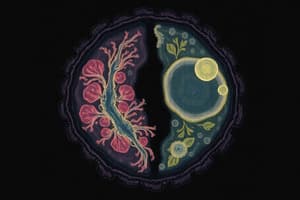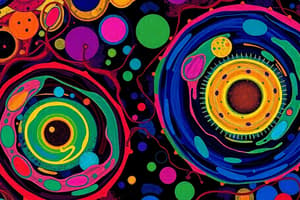Podcast
Questions and Answers
What is the primary function of the cell cycle?
What is the primary function of the cell cycle?
- To repair damaged tissues
- To synthesize proteins for growth
- To duplicate DNA and segregate into daughter cells (correct)
- To produce energy for cell functions
During which phase does the cell focus on replicating its entire genome?
During which phase does the cell focus on replicating its entire genome?
- Mitosis
- S Phase (correct)
- G1 Phase
- G2 Phase
What occurs during the G2 Phase of the cell cycle?
What occurs during the G2 Phase of the cell cycle?
- Growth and production of organelles
- DNA replication
- Cellular division
- Protein production and DNA verification (correct)
Which phase of the cell cycle is characterized by metabolic maintenance without preparation for division?
Which phase of the cell cycle is characterized by metabolic maintenance without preparation for division?
What is the role of checkpoints in the eukaryotic cell cycle?
What is the role of checkpoints in the eukaryotic cell cycle?
Which type of cell division produces two daughter cells with identical genetic material to the parent cell?
Which type of cell division produces two daughter cells with identical genetic material to the parent cell?
Which of the following describes binary fission?
Which of the following describes binary fission?
What is the outcome of the Mitosis phase in cell division?
What is the outcome of the Mitosis phase in cell division?
What is the ultimate goal of mitosis?
What is the ultimate goal of mitosis?
During which stage of meiosis do homologous chromosomes separate?
During which stage of meiosis do homologous chromosomes separate?
How many times does a cell divide during the process of meiosis?
How many times does a cell divide during the process of meiosis?
What happens during Prophase I of meiosis?
What happens during Prophase I of meiosis?
What is the result of cytokinesis after Telophase I in meiosis?
What is the result of cytokinesis after Telophase I in meiosis?
In which stage of meiosis do bivalents align at the metaphase plate?
In which stage of meiosis do bivalents align at the metaphase plate?
What remains paired during Anaphase I that differs from mitosis?
What remains paired during Anaphase I that differs from mitosis?
Which of the following statements about mitosis is true?
Which of the following statements about mitosis is true?
What occurs during Prophase II of meiosis?
What occurs during Prophase II of meiosis?
In which stage of Meiosis II do the sister chromatids separate?
In which stage of Meiosis II do the sister chromatids separate?
What results from cytokinesis after Telophase II in meiosis?
What results from cytokinesis after Telophase II in meiosis?
What characterizes Metaphase II?
What characterizes Metaphase II?
How is gametogenesis defined?
How is gametogenesis defined?
Which process occurs in the wall of the seminiferous tubules?
Which process occurs in the wall of the seminiferous tubules?
What happens to the chromatid after Anaphase II?
What happens to the chromatid after Anaphase II?
Where does Oogenesis occur?
Where does Oogenesis occur?
Flashcards are hidden until you start studying
Study Notes
Cell Cycle Overview
- Cell cycle consists of stages allowing cells to divide and produce new cells.
- Key functions include DNA duplication and segregation into genetically identical daughter cells.
- Main phases include G1, S, G2, Mitosis, and G0.
Phases of the Cell Cycle
- G1 Phase: Newly formed daughter cells grow and produce proteins and organelles.
- S Phase: Focuses on synthesizing new chromosomes; the entire genome is replicated.
- G2 Phase: Characterized by extensive protein production and checks for DNA integrity.
- Mitosis: Parent cell undergoes complex steps to distribute vital materials and chromosomes to daughter cells.
- G0 Phase: A metabolic state for cells that are not preparing for division.
Cell Cycle Checkpoints
- Checkpoints occur to halt progression until conditions are favorable or DNA is repaired.
- Key checkpoints occur at the end of G1, G2/M transition, and during metaphase.
Types of Cell Division
- Prokaryotic Cell Division (Binary Fission): Asexual reproduction where an organism duplicates its DNA and divides into two equal parts.
- Eukaryotic Cell Division:
- Mitosis: Produces two daughter cells with identical genetic components to the parent.
- Meiosis: Produces four cells with half the genetic information of the original cell.
Mitosis Stages (Mnemonic: "Pee on the MAT")
- Prophase: Chromosomes condense and spindle apparatus begins to form.
- Metaphase: Chromosomes align at the metaphase plate.
- Anaphase: Sister chromatids separate and move to opposite poles.
- Telophase: Nuclear membranes reform around each set of chromosomes.
Meiosis Overview
- Meiosis involves two divisions (Meiosis I and Meiosis II) resulting in four haploid cells.
- Goal is to create daughter cells with half the number of chromosomes.
Meiosis I Stages
- Prophase I: Chromosomes condense and homologous pairs align and pair up.
- Metaphase I: Bivalents align randomly on the metaphase plate.
- Anaphase I: Homologous chromosomes separate to opposite poles without centromere splitting.
- Telophase I & Cytokinesis: Homologs reach poles, nuclear membranes form, and cytokinesis creates two haploid daughter cells.
Meiosis II Stages
- Prophase II: Nucleoli and nuclear envelopes disperse; chromatids become thicker and spindle fibers reform.
- Metaphase II: Single chromosomes align on the metaphase plate with kinetochores facing opposite poles.
- Anaphase II: Centromeres split, and sister chromatids move to opposite poles, becoming independent chromosomes.
- Telophase II: Nuclear envelops form around chromosomes; cytokinesis produces four haploid gametes.
Gametogenesis
- Process of producing gametes via meiosis.
- Spermatogenesis: Occurs in seminiferous tubules, where spermatogonia differentiate into sperm.
- Oogenesis: Occurs in ovaries, where oocytes develop into eggs.
Studying That Suits You
Use AI to generate personalized quizzes and flashcards to suit your learning preferences.





